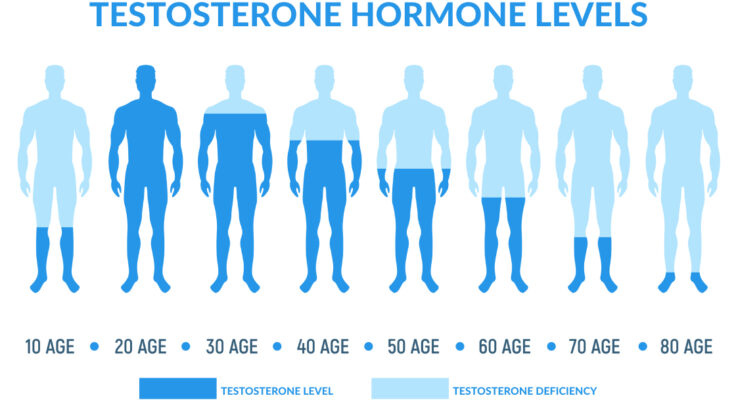Men's Hormone Imbalance Therapy in San Diego
When we think about male hormones, we have to recognize testosterone levels. Testosterone plays an enormous role in how a man feels, his motivation and zest for life, and also his risk of health conditions like diabetes or heart disease.

As men age (starting at around age 30), testosterone levels naturally decline by about 0.3-1.5% per year. However, in the past several decades, men’s testosterone levels are now significantly lower than they used to be (unrelated to aging). In fact, testosterone deficiency affects almost 40% of men aged 45 and older (which is likely an underestimation).
What Does Testosterone Do?
Testosterone is a hormone produced in the testes that is responsible for male sexual characteristics like deepening of the voice during puberty, muscle strength and size, and libido.

Having adequate levels of this hormone are essential not only for physical health like muscle size and performance in the gym, but also for mental health.
Testosterone plays a large role in mood, motivation, cognitive function, and decision making abilities.
Having adequate testosterone also plays a protective role against health conditions such as cardiovascular disease, atherosclerosis, diabetes, and cognitive decline.
According to a study of 800 men over 50 years old that were followed for 18 years, the group of men in the lowest ⅓ of testosterone levels had a 33% increase rate of death from all causes compared to the group in the highest ⅓.

Testosterone plays many important roles in the body, including:
- Cardiovascular health
- Reproductive health
- Brain and cognitive health
- Immune system modulation
- Energy metabolism
- Bone support health
There are many factors that play a role in these decreasing testosterone levels including lifestyle, diet, environmental factors, and body weight. At our health clinic we’ll explain the role of testosterone, symptoms of low testosterone, causes for low testosterone, testing methods, and finally how to optimize your testosterone levels.
What Are Symptoms Of Low Testosterone?
Symptoms Of Low Testosterone Can Include:
- Low sex drive
- Difficulty achieving and maintaining an erection
- Cognitive decline
- Fatigue
- Decreased muscle mass
- Inability to gain muscle despite working out
- Increased body fat or weight gain
- Low motivation
- Decreased bone density
- Infertility

Causes Of Low Testosterone
There are many possible causes of low testosterone.
Primary hypogonadism (testicular disorder) and secondary hypogonadism (disorder at the pituitary hypothalamic level) are two medical conditions that can cause low testosterone levels in males.
There are also many nutrition and lifestyle factors that can contribute to reduced testosterone levels in males.
Causes of low testosterone can include:
- Obesity
- Insufficient exercise
- Toxin exposure
- Chronic stress
- Excess sugar intake
- Chronic sleep deprivation
- Low vitamin D levels
- Poor gut health
- Prescription drugs (like statins or opiates)
- Trauma to testes
- Sleep apnea
- Prolactinoma
Naturopathic Approaches To Low Testosterone
The following are basic strategies that naturopathic doctors can address when it comes to supporting healthy testosterone levels in males.

- Staying physically active and lifting weights
- Limiting exposure to toxins, heavy metals, and chemicals
- Adequate Vitamin D levels have a large impact on testosterone levels (many people do not have sufficient vitamin D levels).
- Eating a healthy diet that incorporates all major food groups including high quality fats, proteins, and carbohydrates
- Avoiding smoking and excessive alcohol intake
- Restful sleep – around 7-8 hours per night for most men
- Stress reduction through diaphragmatic breathing, yoga, meditation, tai chi or other practices
- Testosterone replacement therapy – when needed
Of course a more personalized plan based on a detailed medical history and appropriate laboratory tests is created to support optimal testosterone levels when working with a naturopathic doctor.
Get Your Male Hormone Levels Tested Today
Book a discovery call with one of our experienced naturopathic doctors to learn how we can help.
Book your appointment in San Diego today!

Testing For Male Testosterone Levels
There are many laboratory kits available for measuring hormones including blood, urine, and saliva. Each approach has its own strengths and weaknesses.
The following are serum blood tests that are commonly used as the gold standard for evaluating male hormone levels.
- Total testosterone – the range is from 300-1000 ng/dL, however most men feel their best at the upper part of the reference range between about 700-1000 ng/dL. However, total testosterone does not take into consideration how much testosterone is bound (not readily accessible).
- Free testosterone – this is an important marker to check and measure the testosterone that is unbound and freely available.
- LH (luteinizing hormone) – this is the signal from the brain to tell the testes to make testosterone
- FSH (follicle stimulating hormone) – this is the signal from the brain to tell the testes to make sperm
- DHT (dihydrotestosterone) – this is a metabolite of testosterone. High levels are associated with hair loss and growth of the prostate gland.
- SHBG (sex hormone binding globulin) – this is a protein that binds to testosterone and carries it around the body. If SHBG levels are too high, this means that not enough testosterone is freely available to the body.
- Albumin – this is a protein that also binds to testosterone and carries it around the body. Albumin binds to testosterone less strongly than SHBG.
- Estradiol – this is a measurement of estrogen in the body. Testosterone can be converted into estrogen through a process called aromatization. This can happen with things like chronic stress or weight gain. Estrogen is important and needs to be in a normal range (not too high, and also not too low).

TRT - Testosterone Replacement Therapy
Natural approaches to optimizing testosterone levels have a dramatic impact on most men. However, in some cases testosterone replacement therapy is indicated and can be a game changer for men. TRT is typically performed through either intramuscular injections or topically with creams.
When on testosterone replacement therapy, blood work will need to be monitored periodically to make sure you are on an optimal dose and feeling your best.
When taking testosterone replacement therapy, the signal from the brain to the testes (LH and FSH) is diminished and therefore fertility can be affected. However, there are several medications such as clomid or HCG that men can take while they are on testosterone to maintain fertility.
Ready to schedule an appointment?
